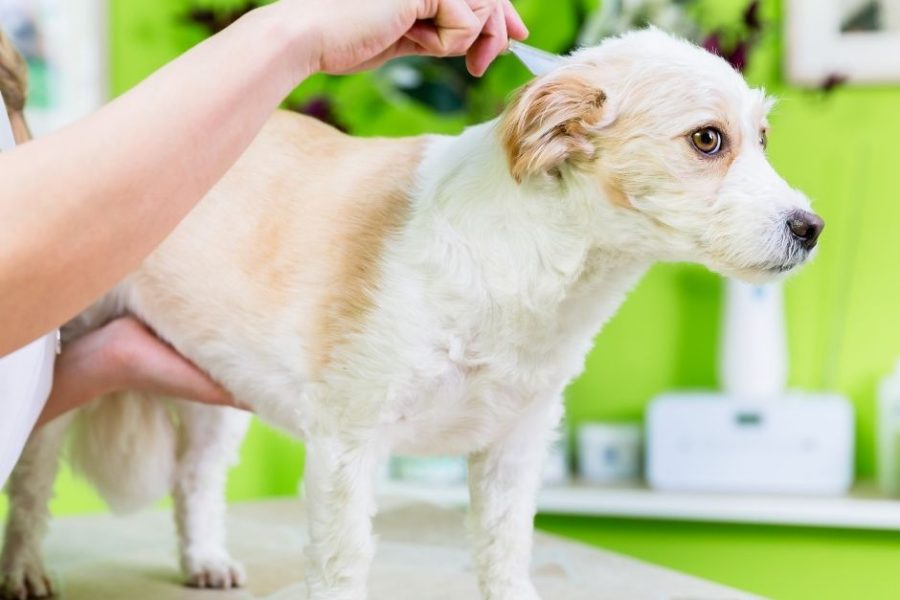
Do You Have Fleas? Preparing Your Virginia Home for a Flea Treatment
Obviously, it is gross to think you have fleas crawling around your home. And then to think they are biting your pet all over and may start biting you too? No one wants that for the family or the pets. So, if you have called out a local exterminator to get rid of fleas in your home, you are on the right path. However, you should know there is a great deal you need to do to begin preparing your home for flea treatment for the process to work.
Let James River Pest Solutions give you a few tips on what to do before your flea treatment, so they go away and don’t come back.
A Few Flea Facts
There are an estimated 2,000 species of flea worldwide and over 300 in the U.S. alone. Homeowners most often think of a typical flea that will jump on their animals. But, there are four types of fleas that affect the U.S. the most. They are the Cat Flea, the Dog Flea, the Human (or household) Flea, and the Oriental Rat Flea.
As you may know, fleas feed on blood, and they are not real picky about which animals from which they partake. The flea is tiny and flat shaped and is reddish-brown in color. It has six legs with no wings. And instead of flying, they jump. If you have ever tried to catch one, you know they jump high and fast.
When a flea makes its way into your hair or on your clothes and bedding, you will need to be treated for fleas just like you would treat your pet, as there are no treatment options for humans. Furthermore, you will need to wash your hair with mild flea shampoo and wash all your clothing and bedding. It is not a pleasant experience, to say the least. And, your pets don’t like it either.
At James River Pest Solutions, we suggest you have a treatment plan with your local exterminator. We are here for all types of insect control in Richmond, Virginia, and the surrounding areas.
Are Fleas Dangerous?
Fleas are more than just a nuisance to your pets. They are blood-sucking insects that feed on humans and pets, causing annoying itching and pain. What’s worse, according to the CDC, fleas can transmit several diseases to humans, including typhus, plague, and “cat scratch disease.” As if that were not bad enough, they are hosts for tapeworms and other parasites. And flea bites can cause bacterial infections when bite areas are not kept clean and scratching continues. This is especially true for those itching yet loved pets.
So, the answer is a clear yes. Fleas are dangerous. But, what can you do to protect your home and family?

Protecting Your Pets and Family
Maybe you had a plan in place to keep fleas out of your home, but it just didn’t quite work. In that case, scheduling a monthly flea and tick spraying service plan in your home will help control fleas and ticks brought in by pets. Additionally, you can help your family reduce the risk of exposure to fleas and their itchy, bothersome bites with the following precautions.
Try the following suggestions in your Virginia home.
- Wash your hands after contact with an animal.
- Have your pets regularly tested for parasites at your veterinarian appointments.
- Give pets their monthly flea treatment as prescribed by the vet.
- Vacuum carpets and other soft surfaces well and often.
- Professionally treat against fleas, ticks, and other insects, as well as the critters that can occasionally make their way into your home.
Around the outside of the home, try these.
- Remove pet waste from the yard.
- Try to keep dirt and sand out of little ones’ mouths.
- Place a tight lid on the backyard sandbox.
- Plant foliage that fleas do not like, such as citronella. That will help with other insects like mosquitoes as well.
- Try not to overwater your lawn. Standing water attracts all sorts of insects.
- Ensure your yard is mowed weekly to stir things up and remove the hiding spots for these pests.
- Tuck your pants into your shoes and wear long sleeves in dense vegetation and brush when traversing your property or heading into the woods.
- Use an EPA-approved flea and tick repellent on all exposed skin.
- After hiking through the woods or walking through dense vegetation, check your clothes and pets for fleas.
What About Flea Infestations?
Flea eggs, which hatch within a day or two, are usually found in bedding, carpets, and sofas. And unfortunately, fleas are incredibly adaptable parasites that can exist inside homes for extended periods. The females will lay up to six eggs after each meal and lay several hundred eggs during their lifetime.
Keeping bedding, carpets, sofas, and other soft surfaces cleaned and treated is essential to keeping an infestation away. Regular treatment by your local pest control company will reduce fleas. However, if the room is not cleaned and picked up, the flea eggs will hatch, and the problem will begin again. And we know you don’t want to start the process all over again.

Prepping Your Virginia Home for a Flea Treatment
The experienced technicians at James River Pest Solutions can help you get rid of fleas by treating your home. In addition to the actual treatment, there are some essential things that you, yourself, should do to prepare for a successful flea treatment. Some of these things are best completed before the treatment and some afterward.
- Start by cleaning clutter from all carpeting and closets. Floors should be completely clear, all but furniture legs.
- Ensure your floor, furnishings, and wall trim are clear and treated.
- Sweep and mop wood, tile, and vinyl floors. If possible, clean before and after the treatment. Also, vacuum carpeting, flooring, upholstered furniture, cushions, mattresses, floor cracks and crevices, drapes, closet floors, and pet resting areas.
- Make sure to use a clean vacuum cleaner bag or canister to get the best suction. Empty the vacuum cleaner’s contents into a trash bag, seal it, and immediately dispose of it outside. And, if your vacuum has a bag, do not keep the bag in there for future use. Use it once and get rid of it. But, if your vacuum does not have a bag, be sure to wash the inside of the vacuum canister thoroughly. Try to do this outside if possible.
- Make sure you use detergent and hot water to wash all sheets, blankets, and other bedding.
- Wash any clothing, small rugs, and other fabrics that are on or close to your floor. As you may know, a flea can leap 800 times farther than its body length. And it can jump 130 times its height. With these capabilities, fleas could potentially reach clothes that you have hanging up in your closet.
- Thoroughly wash all pet bedding. If you decide to throw it away, be sure to seal it in a plastic bag and immediately dispose of it outside.
- Before your treatment, make sure you store or cover all food, and cover fishbowls, fish tanks, and reptile aquariums. In fact, it is best to remove any small animal from home, to keep them from inhaling the pesticide.
- Don’t forget to take your pet to get flea treatment by a vet or a professional groomer during the treatment.
- Then, cut your grass, rake your leaves, and remove any toys and debris from your yard.
- Keep your family and pets out of the home during the treatment. Afterward, don’t return until the insecticide is dry. Drying usually takes 3 or 4 hours.
Your commitment to the above measures will provide for a flea-free home for years to come. In the meantime, be sure to give your local pest control company a call to discuss your flea situation and schedule an effective treatment plan.
James River Pest Solutions Helps You Prepare for a Flea Treatment
Congratulations. Simply reading this article helps you get prepared for a home flea treatment. You are one step ahead of most in gaining control of the pests in your home. James River serves Richmond and the surrounding areas with superior quality pest control and friendly customer service.
We would love for you to contact us to schedule a free consultation. James River Pest Solutions looks forward to providing you with excellent service exceeding your expectations.